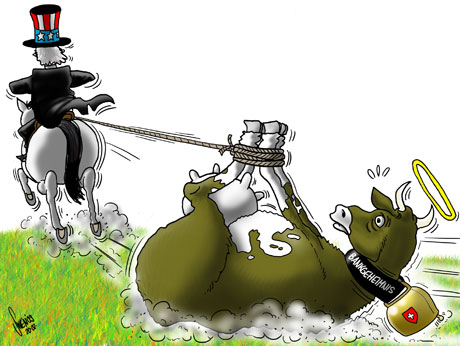Swiss face hard choices over bank secrecy

The future of bank secrecy, the legality of buying stolen data and the nature of the relations between Switzerland and Germany continues to make waves.
The finance ministers of both countries have given separate interviews to Sunday’s German-language Swiss newspaper NZZ am Sonntag in which each sees difficult times ahead for Switzerland.
In his interview, the German finance minister, Wolfgang Schäuble, could not have been clearer.
“We have abolished bank secrecy in Germany. And I can tell you that we are going to abolish bank secrecy in the European Union,” he said.
“And that will have an impact on Switzerland, because it is influenced by what happens in the European Union. It is a process which is not easy for Switzerland.”
He denied trying to put pressure on Switzerland, but pointed out that times have changed, and that with greater mobility of persons, business and assets, there is more opportunity for abuse.
He said that while he understood the indignation of much of the Swiss public, he was keen to stress that Germany was not making some sort of “sinister attack” on the country.
He and his Swiss counterpart, Hans-Rudolf Merz, have different views of the situation, but both want to solve the problem through better cooperation, he assured the paper.
Hard decisions
Merz, for his part, has made it clear that Switzerland will refuse to provide information about suspected tax evaders if their names have been obtained from stolen data.
He repeated that he hoped for the speedy conclusion of a dual tax agreement with Germany, which would mean that the German government would no longer have an interest in buying stolen data.
But he told the paper that if Switzerland wants market access for its financial products in countries of the European Union, a solution will have to be found to the problem of the automatic exchange of information.
“We have to weigh up the different interests, and then make a decision…. But at the moment people are behaving as if it is possible to refuse to exchange any information at all and still have unlimited market access. That is not an option.”
He sees alternatives to the exchange of information, including the deduction of tax at source, which would preserve bank secrecy, while removing the incentive to steal data.
“But that would only work if the other states agree,” he said.
Legality
In both Switzerland and Germany many prominent figures have described German readiness to buy the data as “receiving stolen goods” – a description Schäuble rejected.
He has no qualms. A similar case involving bank clients in Liechtenstein set a precedent in 2008, since no court had queried the legality of this decision.
“Given the similarity with the case two years ago, we had no leeway to decide differently now,” he explained.
For him, a state which observes the rule of law is in any case duty-bound to pursue suspected tax evaders.
He assured the paper that filling the state coffers is not the “central motive” in buying the information. “Our deficits are so high, that these purchases will not make much difference,” he said.
“What is important for me is that people in Germany should feel that despite all the divisions in society, they are treated fairly. If people who are not socially disadvantaged do not pay their taxes, and on a scale that they can’t not have known about it, a state where the rule of law is paramount cannot look the other way.”
Decentralisation
The purchase of the data is not in fact a matter for the central German government, but for the finance ministries of the different German states. The affair came to light over a CD being offered to the state of North Rhine-Westphalia, but since then indications are surfacing of further cases.
A spokeswoman for the government of Bavaria confirmed on Sunday that ministers were discussing whether to buy such data. The Bavarian prime minister has indicated that he would only do so if it had been obtained legally.
According to the magazine Spiegel, the information in question comes from two banks in Switzerland and Luxembourg.
And in Baden-Württemberg the government is split over whether to buy the CD that has been offered to them. While the finance minister has said he is in favour if such a purchase is legal, the justice minister said on Saturday that there can be no deal with “crooks”, and that if the data had been obtained illegally, he would veto any purchase.
Meanwhile various media reports say that tax evaders all over Germany are coming clean in order to avoid possible fines.
But the Swiss paper SonntagsBlick reports that others are taking their money from their bank accounts and investing it in valuables instead – much to the delight of jewellers in Zurich.
Julia Slater, swissinfo.ch
Switzerland has been under continuous attack in the past 12 months for helping foreign tax evaders hide their assets. The global crusade coincided with the devastation of the financial crisis leaving large holes in the budgets of many countries.
The OECD placed Switzerland on a “grey list” of uncooperative tax havens in April last year. The Swiss were removed in September after renegotiating more than a dozen double taxation treaties, but they have refused to automatically transfer information to tax investigators without proof of crimes.
A former German finance minister referred last summer to the Swiss as Indians running away from the cavalry. His Italian counterpart said that he wanted to “bleed dry” the financial sector in the Italian-speaking part of Switzerland.
Several countries, including Italy, France, Britain and the US, launched tax amnesties last year in an effort to repatriate assets from tax cheats. These are forecast to damage the Swiss offshore banking industry.
Switzerland was particularly annoyed at the aggressive Italian amnesty that saw surveillance and tailing of cross border suspects going into Switzerland. The Swiss suspended talks on the new double taxation treaty in protest.
The most damaging tax evasion case involved the activities of UBS bank in the US. A year ago, UBS was fined $780 million after admitting helping US citizens to dodge taxes. It also handed over data of 285 account holders.
In September, the Swiss government agreed to transfer the details of 4,450 UBS clients to the US – in effect violating Swiss banking secrecy to prevent a ruinous court case for UBS.
Also last year a former employee of HSBC private bank in Geneva ran away with sensitive client data that he handed over to the French authorities.
In January an informant offered to sell the authorities in the German state of North Rhine-Westphalia the data of about 1,500 possible tax evaders with bank accounts in Switzerland.
Subsequently similar data has been offered to more German states, triggering heated debate in both countries.

In compliance with the JTI standards
More: SWI swissinfo.ch certified by the Journalism Trust Initiative





You can find an overview of ongoing debates with our journalists here. Please join us!
If you want to start a conversation about a topic raised in this article or want to report factual errors, email us at english@swissinfo.ch.